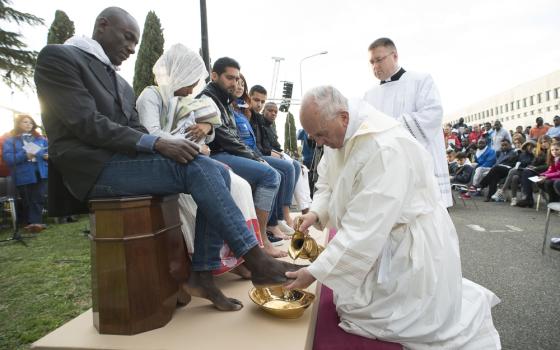Last year, Pope Francis issued a decree revising the rules for the traditional foot-washing ritual on Holy Thursday, saying the rite should no longer be limited to men and boys but also include women and girls. A rash of headlines was received with mixed reactions by the Catholic community across the globe. While some individual priests in Kenya long ago adapted the ritual of foot washing to women, others adamantly cling to tradition.
Sr. Esther Kimani, a Fransciscan Elizabethan sister who works as national coordinator of the Kenya bishops' Pontifical Missionary Childhood has never had her foot washed but has witnessed women taking part in the ritual on two occasions.
One of them happened in 2015 while she was attending a retreat at Mwangaza Jesuit Retreat Center in Nairobi. The officiating priest washed the feet of the first two people in line, looked at the other retreat participants and said, "Do likewise." Sr. Kimani explains that those gathered at first did not understand, and the priest repeated his request two more times. "One of us understood, took the basin of water and the towel, and washed the person next to him," she said. Sr. Kimani then followed suit herself. "It did not matter whether male or female, and we were more than12 in number," she recalls. "At the end of the exercise, the priest said, 'this is what we are called to do — to wash each other's feet.' "
She points out that the Holy Father has washed the feet of non-Catholics as well as migrants. "We are encouraged to do likewise," she says, "because foot washing is unlike celebrating Mass — a rite reserved for ordained ministers. She suggests that each one of us needs to be washed and then turn to wash another person, so that all can be of service to one another. When we do this, the church is moving forward in Christ's mission.
I conducted interviews in the Archdiocese of Nairobi and beyond to get other Catholic views on the subject. Kenya being a predominantly patriarchal country, I had prepared myself for the answers I could expect. I was surprised at some of the responses because in my inmost being I thought Kenyans were still tied to those cultural norms that discriminate against women.
Sr. Tecla Sambu, a Franciscan Missionary of St. Joseph and the national executive secretary for the Commission for Clergy and Religious, says her feet have been washed. "It was a humbling experience that somebody else was washing my feet," she says. Since foot washing is all about service, she favors the church breaking the tradition of washing the feet of men alone because both men and women are called to service.
Fr. Celesino Bundi, the national director of Pontifical Mission Societies in Kenya, says he has never washed the feet of women during the Lord's Last Supper Mass, "majorly because of our cultural setting and traditions that have been handed down." He goes on to state that, when the missionaries first arrived, basing their practices on the Jewish culture in the days of Christ, they followed the tradition of washing men's feet. But he sees nothing wrong about including women.
"As time keeps evolving, washing of feet is seen as a service not a sacrament. Therefore, it is not breaking any doctrinal aspect of the church, neither is it creating any barrier to reach out," he asserts. "When we say we are called to serve, we are called to serve both men and women, and washing of the feet is a clear indication of service to all."
In addition, Fr. Bundi says, "the Holy Father is right and there is no conflict between washing of the feet and the main business of preaching the word and calling people to holiness." If he goes to a parish and finds women among those prepared by the leaders to be washed, he says, he wouldn't mind washing their feet. "But I will not impose it on the people," Fr. Bundi says. "The people will do it up to a point where they feel they are inclusive enough."
Despite the comfort level of some, other parishes find that such an inclusive practice is outside their experience.
"I have never been washed," declares Anastasia Nzomo, one of the lay liturgists at St. Augustine Parish in Juja.
"As a liturgist, I happen to be among the people that choose those to be washed, but we have never selected a woman." (Twelve participants are often selected to replicate the disciples in the foot-washing practice.) She said when asked by the parishioners the reason only men are selected for the foot washing ritual, she responds, "We have never witnessed a woman's foot being washed."
She says she was trained in a liturgist's seminar never to include women in the exercise. "And we [her fellow liturgists] have always wondered why; yet Jesus was not selective," she says.
"We have not found anyone who can give us an answer to this question that has always bothered us. Maybe you, Sister, could explain to me today," she asks expectantly.
I found myself in a fix when she bounced the question back at me. I knew I didn't have an answer because it would not be enough to tell her, in our modern world, that Jesus had washed the feet of men only.
She reminded me of a scene I witnessed during the Lord's Last Supper Mass back in 2009 in St. Peter's Church, an outstation of Holy Family Parish, Mokwo, situated in the remote town of Kapkoi. On this unfortunate day, the men who had come for the evening Mass did not number 12, and to make up for it the priest ordered that men lingering outside or watching nearby be brought in. Unfortunately, they happened to be drunkards. Those who had come for the evening Mass were mostly women and girls from the Kapkoi Primary School, who formed the choir.
I sympathized as I watched these men walk up the aisle to the sanctuary to fill in the empty pews of those to be washed. They had no clue what was happening, partly due to the influence of too much alcohol. The women, not expecting to be included, joined the girls in chorus to God as the washing continued. Perhaps a time will come in their lives when they will be washed or even witness a woman being washed. As for me, I wanted to be positive enough to see this as a turning point, the day of salvation for these men brought from nowhere.
After the Mass, I asked the priest why he couldn't wash the feet of women instead of having to send for unprepared men who did not understand the meaning of what was being done to them. "The church does not permit women to partake of the washing," he replied.
Nevertheless, Mrs. Nzomo looks forward to the day when she will be told as a liturgist to select an equal number of women, men, youth and even children to have their feet washed.
"We should not be discriminated upon," she concludes.
Bernard Njiri, a student pursuing a justice and peace degree at the Catholic University of Eastern Africa, approves of the pope's practice of washing the feet of women, non-Catholics and refugees. "He is giving a new picture of how today's church should approach people, and according to Christ, there is no Jew or Gentile, no slaves or freed men — we are all equal," says Njiri. He suggests washing women's feet be included in liturgical worship: "Even standing traditions can be changed because there is always a renewal of the church."
But among clergy in Kenya, change may be slow. Bishop Cornelius Korir, of the Eldoret Diocese, says in 35 years of being a priest, he has never washed a woman's feet on Holy Thursday. He doubts he will, until the Catholic faithful are educated on the importance of including women in the practice. Now, he says, "it is something new to them."
Now that the Holy Father has set the course — one inspired by Christ — we should respond. The message that Jesus was trying to communicate practically and verbally in the washing of feet is very clear. It is that we should offer humble services to one another. It is a call to all of us to be present for our brothers and sisters regardless of religion, gender, race and age. At times, we do not need to go very far. We can offer a helping hand to those we come in contact with, in our places of work, in the streets, on our way to something else. We can sacrifice our time for a worthy cause and, for sure, the small things we do for the least of our brothers and sisters, we do them for Jesus.
[Adelaide Ndilu is a Sister of the Immaculate Heart of Mary and the administrator of Radio Waumini in Nairobi, Kenya.]
Enhance your Holy Week and the Easter season by visiting the free Celebration 'Lenten / Easter' page.

